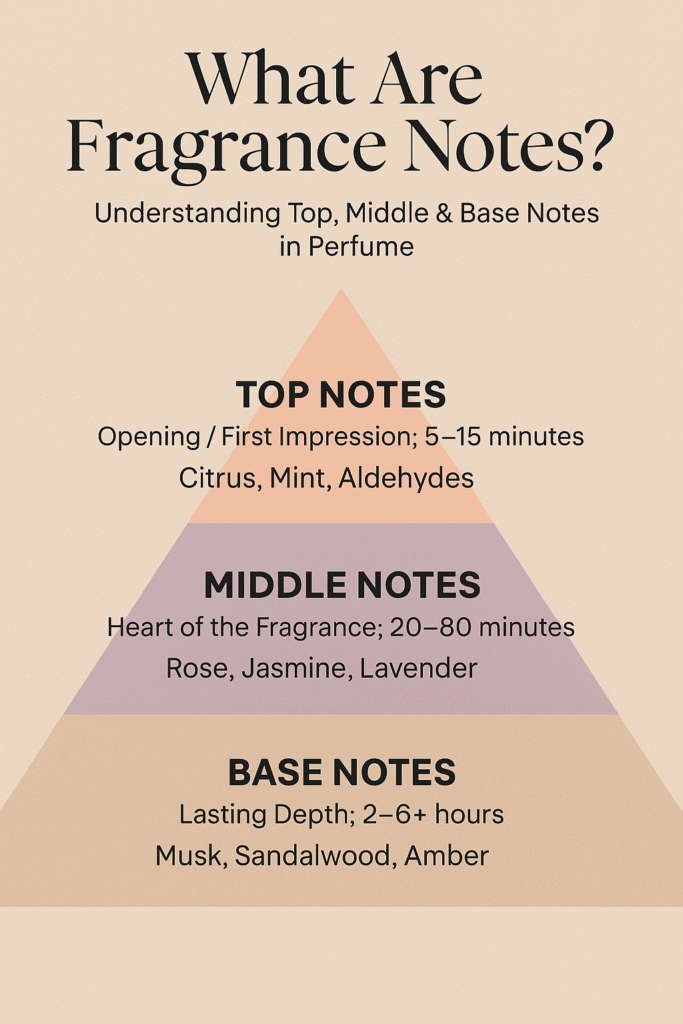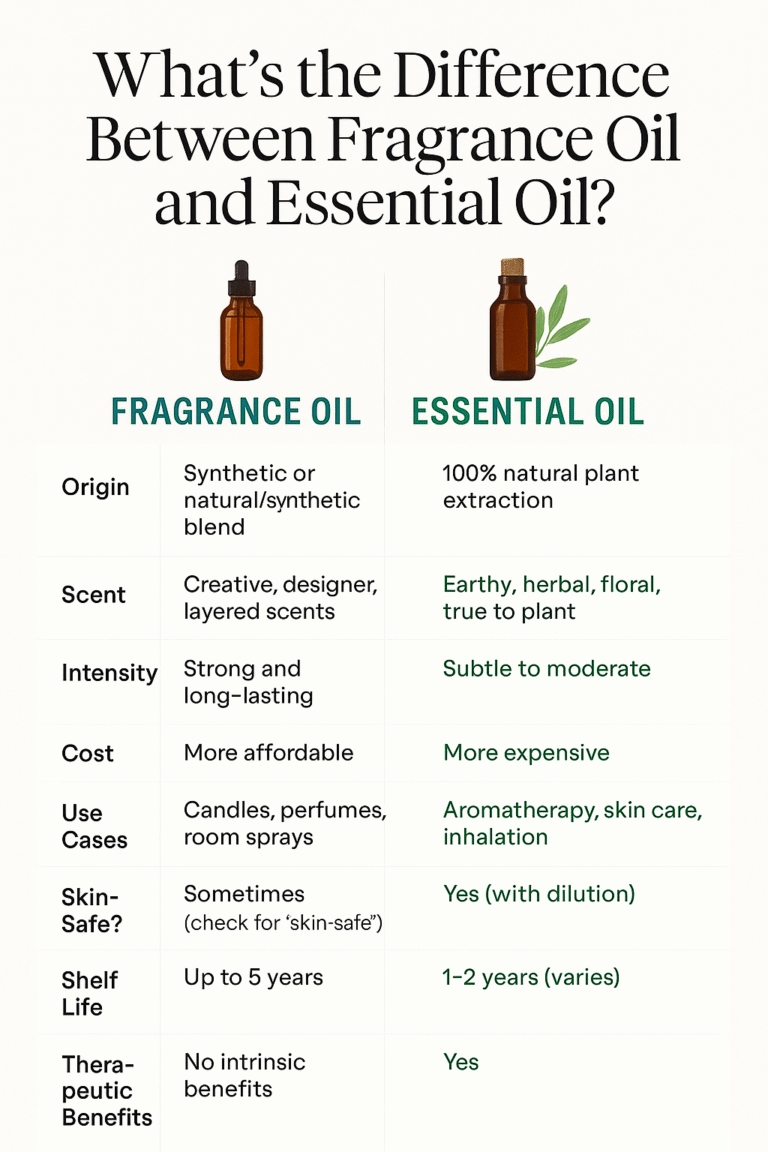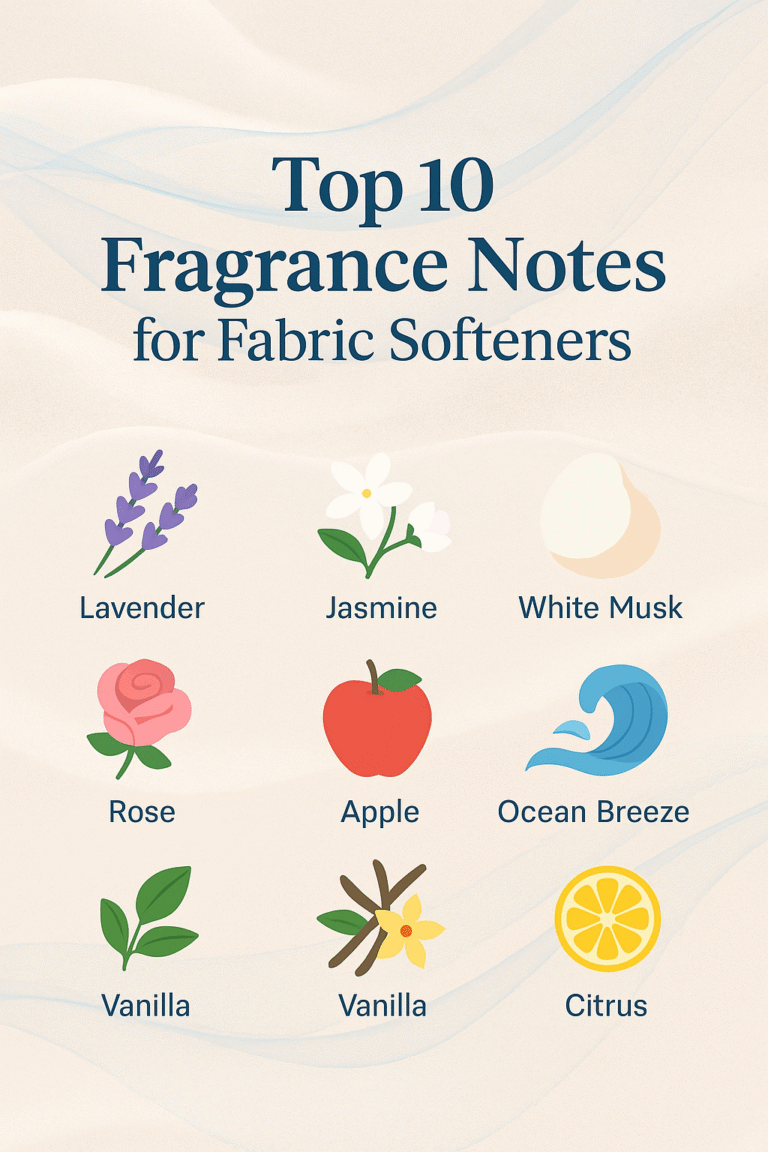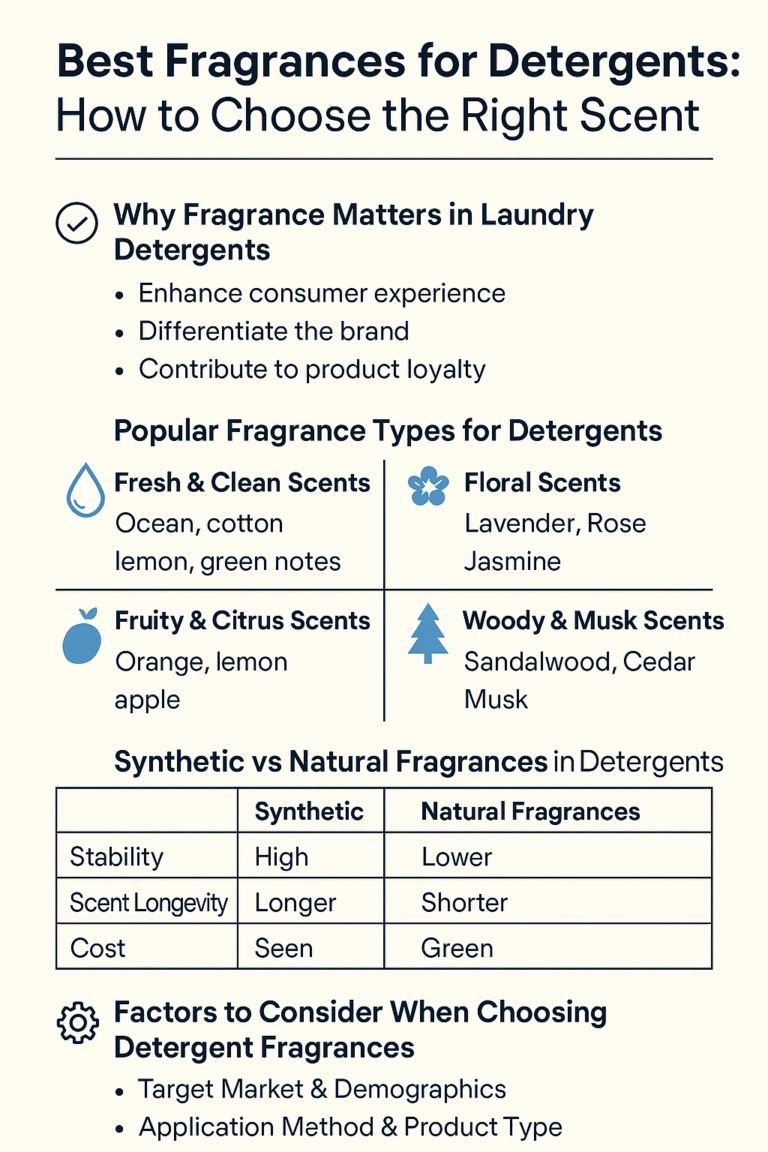What Are Fragrance Notes?
🌸 What Are Fragrance Notes?
Understanding the Building Blocks of Every Perfume
🧼 1. Introduction: Why Fragrance Notes Matter
Every scent tells a story. Whether it’s the sparkling freshness of citrus in the morning or the warm, sensual trail of musk in the evening, perfumes and fragrances unfold over time like chapters in a book.
This olfactory progression is made possible by fragrance notes—the carefully selected ingredients that make up a perfume or scented product’s top, middle (heart), and base layers.
For perfumers and consumers alike, understanding fragrance notes is essential to appreciating how a scent is built, how long it lasts, and how it interacts with your skin or the environment.
🧪 2. The Fragrance Pyramid Explained
The fragrance pyramid is the traditional way perfumers organize a perfume’s aromatic profile. Each layer of the pyramid corresponds to the evaporation rate and perception timeline of different aromatic compounds.
🔹 Top Notes: The First Impression
Top notes are the lightest and most volatile components in a fragrance. They’re the first scent you smell when applying a perfume—and often the first to fade.
- Function: Grab attention; set the tone
- Duration: 5–15 minutes
- Common Ingredients:
- Citrus oils (lemon, bergamot, grapefruit)
- Green notes (mint, basil, eucalyptus)
- Aldehydes (for sparkle and sharpness)
They are often bright, fresh, and uplifting, creating that “wow factor” in the opening.
🔸 Middle Notes: The Heart of the Fragrance
Also called heart notes, these emerge once the top notes evaporate. They represent the main body and theme of the fragrance.
- Function: Carry the identity of the scent
- Duration: 20–60 minutes
- Common Ingredients:
- Floral notes (rose, jasmine, ylang-ylang, lavender)
- Fruity tones (peach, raspberry)
- Spices (cinnamon, cardamom)
Heart notes are more complex and may soften the sharpness of top notes while bridging into deeper base notes.
🔻 Base Notes: The Long-Lasting Foundation
Base notes are heavy, slow-evaporating molecules that remain after the top and middle notes dissipate.
- Function: Provide longevity and depth
- Duration: Up to 6–8 hours
- Common Ingredients:
- Woods (cedarwood, sandalwood)
- Resins (amber, benzoin)
- Musks and animalic tones
- Gourmand notes (vanilla, tonka bean)
These notes leave the “trail” or sillage that people remember. They also act as fixatives, anchoring lighter notes.
👃 3. The Role of Perfumers in Fragrance Composition
Fragrance design is a science-backed art form. Perfumers, often called “noses,” carefully balance top, middle, and base notes to achieve a fragrance that unfolds harmoniously over time.
They consider:
- Note balance: ensuring top/middle/base ratio works for the product (perfume vs detergent vs shampoo)
- Evaporation curve: how fast each note fades
- Cohesion: ensuring notes complement, not compete
- Stability: ensuring fragrance doesn’t change over time or under heat/light
Some use a “chord” or “accord” approach—blending multiple notes to create a new, unified scent impression (e.g., leather accord, ocean accord).
🌿 4. Popular Fragrance Note Examples
Understanding notes is easier with real-world examples. Below are two classic structures.
Example 1: Citrus Aromatic Cologne
Bright, fresh, uplifting
- Top: Lemon, bergamot, neroli
- Heart: Petitgrain, rosemary, lavender
- Base: Light musks, vetiver
Example 2: Oriental Amber Perfume
Warm, sensual, spicy
- Top: Pink pepper, mandarin, saffron
- Heart: Jasmine sambac, plum, rose
- Base: Amber, vanilla, patchouli, oud
🏷 5. Fragrance Notes Across Product Categories
Fragrance notes aren’t just for fine perfumes. Different products emphasize different notes based on their function:
| Product Category | Focused Notes | Reasoning |
|---|---|---|
| Perfume/EDP/EDT | All three | Complex scent evolution expected |
| Shampoo/Body Wash | Top & Heart | Fresh experience in short time use |
| Fabric Softener | Base notes | Long-lasting freshness on clothes |
| Air Freshener | Top-heavy | Quick burst of freshness needed |
| Candles | Base + Heart | Longer-lasting warmth and depth |
🌍 6. Natural vs Synthetic Notes: A Modern Balance
Fragrance notes may come from:
✅ Natural sources
- Essential oils
- Absolutes (from flowers like jasmine)
- Extracts (e.g., vanilla, coffee)
✅ Synthetic aroma molecules
- Created in labs to mimic or enhance natural scents
- Used for performance, consistency, safety, cost
- Examples: Iso E Super, Hedione, Cashmeran, Calone
Why use synthetics?
- Natural resources may be unsustainable
- Synthetics avoid allergens, reduce animal testing, and lower environmental impact
- Many are IFRA-compliant and widely used by brands like Dior, Chanel, and FY
At FY, our in-house perfumers use both natural extracts and cutting-edge synthetic molecules to build versatile fragrance bases for cosmetics, detergents, and air care products.
🧑🔬 7. Choosing Fragrance Notes Based on Personality and Season
Fragrance is subjective, but here are general guidelines:
| Season | Recommended Notes |
|---|---|
| Summer | Citrus, mint, marine, light florals |
| Winter | Vanilla, amber, wood, gourmand |
| Spring | Green, herbal, powdery florals |
| Autumn | Spice, leather, patchouli, warm fruit |
By personality:
| Personality Type | Fragrance Notes |
|---|---|
| Romantic | Rose, vanilla, ylang-ylang |
| Adventurous | Vetiver, citrus, herbs |
| Sophisticated | Iris, musk, sandalwood |
| Playful | Fruity, candy-like, aldehydes |
Pro tip: Always test on your skin and let it settle for 20–30 minutes to experience the full evolution of notes.
🌱 8. How FY Uses Fragrance Notes in B2B Formulation
At FY, we formulate custom scents for:
- Detergents & Fabric Softeners: encapsulated base notes for long-lasting freshness
- Personal Care: top-heavy, skin-safe blends that match your brand DNA
- Fragrance Beads: multi-phase release using top, heart, and base
- Air Care: high-impact top notes with environmental stability
- Perfume Bases: tailored pyramids built from regional scent preferences
We offer:
- Scent pyramid design consulting
- Natural/synthetic options based on market regulations (REACH, IFRA)
- Smart encapsulation for time-release or temperature-activated delivery
📚 9. Conclusion: Notes Are the Language of Scent
Fragrance notes aren’t just ingredients — they’re building blocks of memory, mood, and identity.
Whether you’re choosing your next signature scent or developing a private-label fragrance, understanding top, middle, and base notes empowers you to design or select better.
At FY, we help brands around the world translate sensory vision into formulas that resonate — across cultures, climates, and categories.
🧴 Ready to build your own fragrance pyramid?
Contact FY for tailored fragrance solutions → [Insert Contact URL]
❓ SEO-Optimized FAQ: What Are Fragrance Notes?
Q1: What exactly are fragrance notes?
They are individual scent components (e.g., lemon, rose, sandalwood) categorized into top, middle, and base based on how quickly they evaporate and when they’re detected in a fragrance.
Q2: What’s the difference between top, heart, and base notes?
- Top: Light, initial scents that fade fast
- Heart: Core identity of the fragrance
- Base: Long-lasting foundation with depth
Q3: Are all fragrance notes natural?
No. Many are synthetic aroma compounds, used for consistency, cost-effectiveness, and allergen avoidance. Most modern perfumes use a blend of natural and synthetic notes.
Q4: How long does each fragrance note last?
- Top: 5–15 mins
- Heart: 20–60 mins
- Base: 2–6 hours or more
Q5: Can FY create a custom scent using specific notes?
Yes! FY’s perfumers work with clients to build custom scent pyramids, aligned with brand identity, target markets, and application needs.




